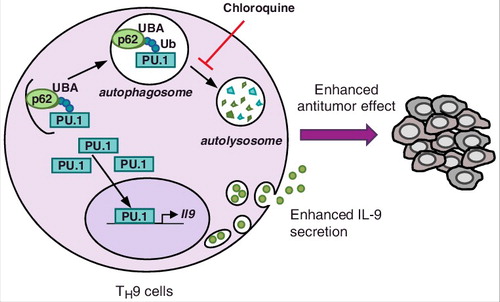Figures & data
Figure 1. Selective autophagy prevents TH9 cell differentiation. During TH9 cell differentiation ubiquitinated (Ub) PU.1 is recruited by p62, which recognizes K63 ubiquitination through its UBA domain. PU.1 is then degraded by selective autophagy, which leads to reduced IL-9 expression and anticancer immune responses in the tumor microenvironment. Chloroquine treatment, which inhibits lysosomal functions, prevents PU.1 degradation and drives enhanced TH9 cell-derived IL-9 secretion and anticancer effects.

